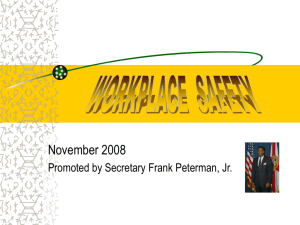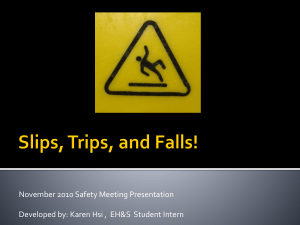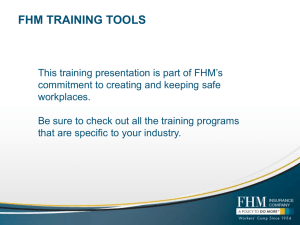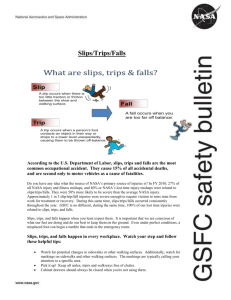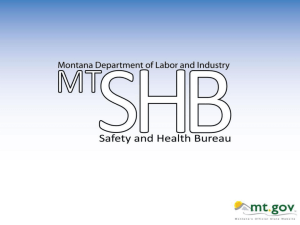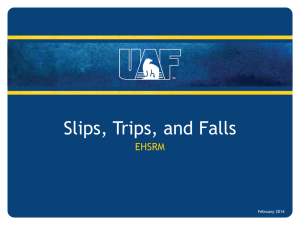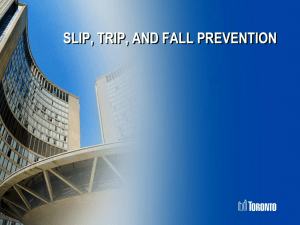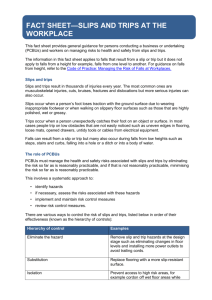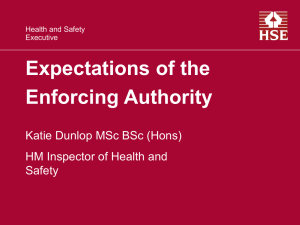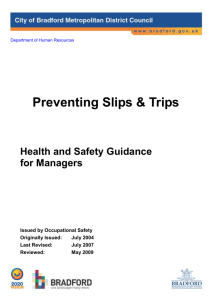Slips, Trips and Falls
advertisement
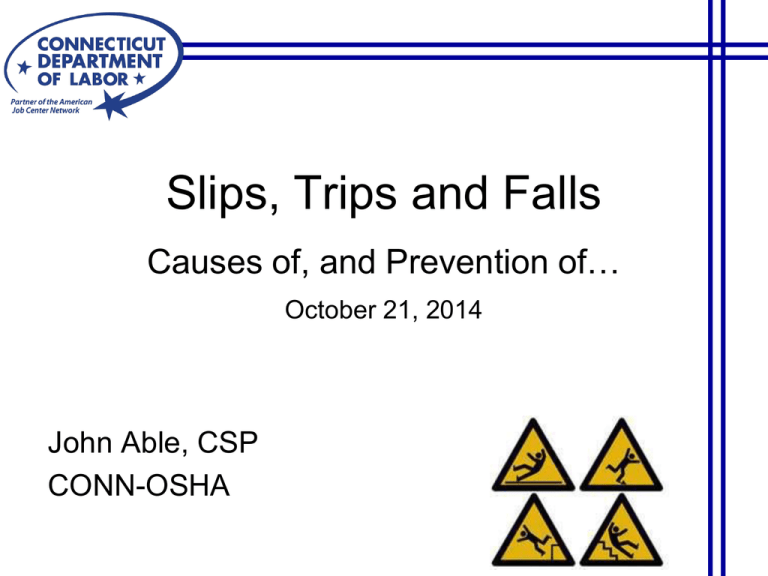
Slips, Trips and Falls Causes of, and Prevention of… October 21, 2014 John Able, CSP CONN-OSHA Think about: • Slip, Trip & Fall hazardous conditions you have observed • Any accidents and/or injuries you have seen resulting from Slips, Trips & Falls • Any behaviors you have observed that could have resulted in a Slip, Trip or Fall Now think about: • Slips, Trips & Falls account for the majority of general industry mishaps • They cause 15% of all accidental deaths, second only to motor vehicle fatalities • 39,400,000 visits to Emergency Departments were made in 2007 – The majority were due to falls – That’s almost 108,000 per hour 24/7/365!!!!! Definitions • Slips – Slips occur when there is too little friction between your feet and the floor surface, and you lose your balance • Trips – Trips occur when your foot (or lower leg) hits an object and your upper body continues moving, throwing you off balance, or – When you step down to a lower surface and lose your balance Definitions • Falls – Falls occur when you are too far off your center of balance – either at the same level, or a lower level Regulations and Standards • OSHA General Duty Clause 5(a)(1) • 1910.21 – 30, Standards for Walking and Working Surfaces • 1910.139, Guidelines for Occupational Foot Protection • National Floor Safety Institute (NFSI) for Walkway Safety Regulations and Standards, cont.) • American National Standards Institute (ANSI) Standard for the Provision of Slip Resistance on Walking/Working surfaces (A1264.2-2001) • American Society of Testing Materials (ASTM) Standard Practice for Safe Walking Surfaces (F1637.95) • ANSI Z41, Guidelines for footwear • National Fire Protection Association (NFPA) 101 Life Safety Code • Individual State Building Codes Causes of Slips • • • • • • • Items on the floor Walking from one surface onto another Sloped surfaces Loose rugs or mats Ramps without slip resistant surfaces Footwear with wet soles Improper footwear Causes of Trips and Falls • • • • • • Items or obstacles on the floor Changes in elevation Rumpled or rolled up floor mats Damaged or uneven steps Uneven surfaces Floor drain covers missing or not in place Conditions Causing Slips, Trips and Falls • • • • • Poor lighting/glare/shadows PPE Improper footwear Improper cleaning methods & products Inadequate or missing signage Conditions Causing Slips, Trips and Falls (cont.) • Poor housekeeping – Like Safety itself, housekeeping is everyone’s responsibility • Good housekeeping can be achieved with these three steps: – Plan ahead – Assign responsibilities – Implement a program Good Housekeeping • Plan ahead – Know what needs to be done, who’s going to do it, and what the work area should look like when you’re done • Assign responsibilities – If necessary, a person should be specifically assigned to clean up (although personal responsibility for cleaning up after him/herself is preferred) • Implement a program – Establish housekeeping as a part of the daily routine (an ongoing procedure) Behaviors Causing Slips, Trips and Falls • Carrying or moving cumbersome objects, or moving too many objects at a time • Not paying attention • Taking shortcuts – not using designated walkways • Being in a hurry and rushing • Not observing posted signage • Entering unauthorized or restricted areas To Summarize: • Slips, Trips and Falls can be caused by: – Unsafe Conditions, or – Unsafe Behaviors All Slips, Trips & Falls are Preventable! – Don’t Slip up on Safety! – Don’t Fall for Hazards! – There’s a way to Prevent every Slip, Trip & Fall! – Pay attention! – Take your time! 3 Steps for Preventing Slips, Trips & Falls – Recognize – Evaluate – Control Risk Factors – Environment – Equipment – Work practices – Individual How do you recognize Hazards? – Proactive safety systems – Analysis of incidents – Measure against published standards – Constant vigilance Evaluation of Hazards – Floors – Lighting – Critical Inventory Method Evaluation of Hazards – Floors • • • • • • • • Finish Texture and pattern Slope Contaminants Condition Environmental conditions Footwear A person’s footstep or gait Evaluation of Hazards • Lighting –29CFR1926.56 –NFPA 101 Life Safety Code Evaluation of Hazards • Lighting (continued) – The Illuminating Engineering Society of North America (IESNA) publishes the following: » Lighting Industrial Facilities, ANSI/IESNA RP7-01 » Lighting Handbook, 9th ed. IESNA HB-9-00 » American National Standard Practice for Office Lighting, ANSI/IESNA RP-1-12 » Lighting for Hospitals and Health Care Facilities, ANSI/IESNA RP-29-06 Evaluation of Hazards • Critical Inventory Method – Severity » 1-3 – Exposure » 1-3 – Probability 1 » 1-3 Severity Exposure Probability 2 3 Behaviors for Preventing Slips, Trips & Falls – – – – – – Do not hurry Watch where you are walking Walk – do not run Stay alert Take extra care when carrying objects Pay attention to environmental conditions Behaviors for Preventing Slips, Trips & Falls (cont.) – Use handrails on stairs – Use care when walking from one surface to another – Wear proper footwear – Maintain good housekeeping – Use care on ladders Controls • Measure or action taken to eliminate hazards and/or to prevent future hazards –Engineering –Administrative/work practices –Personal protective equipment Controlling Unsafe Conditions – If you cannot fix the unsafe condition: • Immediately report the condition • Alert others in the area – Mark the area or stay there until help arrives Recognize, Evaluate, Control – People take upwards of 10,000 steps every day, but how many of them do we take seriously? – The final word on Safety is YOU! • You hold the key to Safety success • Share your insights, safety suggestions and observations with others • We’re all in this together! Remember, you can be careful for years only to get hurt in two seconds of inattention, distraction, or hurrying to get the job done. Instruction, training, and constant reminders can only go so far. It is ultimately up to each individual to: – Plan; – Stay alert; and, – PAY ATTENTION. “Change does not happen when employers adopt new policies, it happens when employees adopt new behavior” Questions? List your three major slip, trip and fall hazards: 1. _______________ 2. _______________ 3. _______________ Slips, Trips and Falls Causes of, and Prevention of… October 21, 2014 John Able, CSP CONN-OSHA
